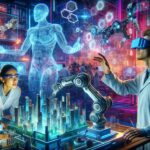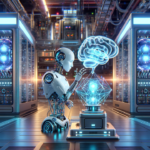Quantum Computers and Artificial Intelligence: Transforming Technology
The digital revolution is advancing at an incredible pace, and at the forefront are two groundbreaking technologies: quantum computing and artificial intelligence (AI). These innovations are not just reshaping industries but also solving problems that were once considered insurmountable. In this blog, we’ll dive into the fascinating worlds of quantum computing and AI, exploring how they work, where they intersect, and their potential to redefine our future.
What Are Quantum Computers?
Quantum computers represent a major leap forward from traditional computing. While classical computers use bits to process information as 0s or 1s, quantum computers use qubits. Thanks to the principles of quantum mechanics, qubits can exist in multiple states simultaneously—a phenomenon called superposition.
How Quantum Computers Work
- Superposition: A qubit can represent 0, 1, or both simultaneously, allowing quantum computers to perform many calculations at once.
- Entanglement: When qubits are entangled, the state of one directly influences another, even across great distances, enabling incredibly fast and complex computations.
- Quantum Parallelism: This allows quantum systems to solve problems far more efficiently than classical computers.
Quantum computing relies on highly controlled environments and cutting-edge technology to maintain stability and reduce errors. These machines require extremely low temperatures to function, making them expensive to build and maintain. However, the potential benefits outweigh the challenges, driving researchers and tech companies to continue advancing the field.
maintain. However, the potential benefits outweigh the challenges, driving researchers and tech companies to continue advancing the field.
Practical Applications
- Cybersecurity: Quantum computers have the potential to break traditional encryption but can also enable ultra-secure communication systems using quantum cryptography.
- Pharmaceutical Research: By simulating complex molecular structures, quantum computing accelerates drug discovery and reduces costs.
- Logistics: Optimization problems in supply chains, transportation networks, and urban planning can be solved more efficiently with quantum computing.
- Climate Modeling: Quantum computers can process massive datasets to improve climate predictions and aid in developing solutions for global warming.
- Material Science: Researchers can use quantum computers to discover new materials with unique properties, potentially leading to breakthroughs in technology and industry.
- Space Exploration: NASA and other organizations are exploring quantum computing for advanced simulations and planning interstellar missions.
The Evolution of Quantum Computing
Quantum computing began as a theoretical concept in the mid-20th century. Visionaries like Richard Feynman and David Deutsch laid the groundwork for this field. The first operational quantum computer was built in the early 2000s, but it was limited in capabilities. Today, companies like IBM, Google, and D-Wave are competing to create more powerful quantum systems, pushing the boundaries of what these machines can achieve.
What Is Artificial Intelligence?
Artificial intelligence is about teaching machines to think, learn, and make decisions like humans. AI systems analyze vast amounts of data to recognize patterns, improve over time, and provide insights or perform tasks.
Types of AI
- Narrow AI: These systems are task-specific, like voice assistants or recommendation algorithms.
- General AI: Hypothetical systems that could perform any intellectual task a human can.
- Superintelligent AI: A theoretical concept where AI surpasses human intelligence in every domain.
AI development is currently focused on narrow AI, which powers much of the technology we use daily. From search engines to virtual assistants like Siri and Alexa, narrow AI has become an integral part of modern life.
Real-World Uses of AI
- Healthcare: AI aids in diagnosing diseases, tailoring treatments, and managing patient care more effectively. AI algorithms analyze medical images, detect anomalies, and predict patient outcomes.
- Finance: From fraud detection to algorithmic trading, AI is revolutionizing financial systems by identifying patterns and predicting market trends.
- Transportation: Self-driving cars and intelligent traffic systems rely heavily on AI to function. These systems use machine learning to adapt to real-world conditions and improve over time.
- Education: AI-powered tools personalize learning experiences, helping students grasp concepts at their own pace.
- Retail: Personalized recommendations, inventory management, and automated customer support are transforming how businesses interact with consumers.
- Gaming: AI creates more immersive and adaptive gaming experiences, challenging players and enhancing interactivity.
The Powerful Combination of Quantum Computing and AI
 When quantum computing meets AI, the results could be transformative. Quantum computers can enhance AI systems by processing data faster and tackling problems that classical computers find impossible.
When quantum computing meets AI, the results could be transformative. Quantum computers can enhance AI systems by processing data faster and tackling problems that classical computers find impossible.
Key Areas Where They Intersect
- Quantum Machine Learning: By using quantum algorithms, AI systems can process massive datasets more efficiently, improving accuracy and speed. This is particularly useful in areas like image recognition and natural language processing.
- Optimization Problems: Whether it’s optimizing a delivery route or managing energy distribution, quantum-powered AI can find better solutions faster.
- Predictive Models: The combination enables more precise forecasting in fields like weather, finance, and healthcare. Quantum-enhanced AI could predict stock market trends with greater accuracy or identify climate patterns that classical models miss.
- Drug Discovery: Quantum computing’s ability to simulate molecules complements AI’s capability to analyze data, expediting the discovery of new drugs and treatments.
- Robotics: Quantum-enhanced AI could lead to robots capable of complex decision-making and autonomous functions in unpredictable environments.
Industries Poised to Benefit
- Healthcare: Faster diagnostics and personalized treatment plans.
- Energy: Smarter grids and more efficient renewable energy solutions.
- Finance: Enhanced risk management and fraud detection.
- Entertainment: Advanced content recommendation systems and improved visual effects.
- Manufacturing: AI and quantum computing can optimize production lines and predictive maintenance.
Challenges and Ethical Considerations
Despite their potential, quantum computing and AI come with challenges and ethical dilemmas.
Ethical Concerns
- Data Security: Quantum computing could disrupt current encryption methods, raising concerns about privacy. Ensuring quantum-resistant encryption becomes a priority.
- AI Bias: Ensuring AI systems do not perpetuate societal biases is a critical challenge. Training data must be diverse and representative to prevent skewed outcomes.
- Workforce Impact: As these technologies evolve, they may disrupt job markets, requiring new approaches to workforce development. Reskilling programs and education reforms will be essential.
- Autonomy and Control: As AI becomes more advanced, questions about autonomy and decision-making arise. How do we ensure AI remains aligned with human values?
Technical Challenges
- Quantum Stability: Quantum systems are highly sensitive to external factors, making them prone to errors. Developing error-correction methods is crucial.
- Scalability: Building quantum computers that can operate at scale is still a work in progress. Advances in hardware and algorithms are needed to achieve widespread adoption.
- Regulation: Setting global standards for both AI and quantum computing is essential to prevent misuse. Governments and organizations must collaborate to establish ethical guidelines.
The Road Ahead
The future of quantum computing and AI is bright, with applications that could transform society:
- Environmental Impact: Advanced climate models powered by these technologies could help combat global warming by identifying effective strategies for carbon reduction.
- Healthcare Innovation: From faster drug discovery to personalized medicine, the possibilities are endless. AI-powered quantum systems could design treatments tailored to individual genetic profiles.
- Space Exploration: Quantum-enhanced AI could solve complex simulations for interstellar travel and aid in analyzing vast amounts of astronomical data.
- Education: Quantum AI could revolutionize education by personalizing curriculums and enabling adaptive learning systems that cater to diverse needs.
- Disaster Response: AI combined with quantum computing could predict natural disasters with greater accuracy, improving preparedness and response efforts.
Collaboration Across Sectors
Achieving the full potential of these technologies requires collaboration among governments, private sectors, and academia. Investment in research, infrastructure, and talent development will drive progress and ensure these tools are used responsibly.
Final Thoughts
Quantum computers and artificial intelligence are two of the most exciting technologies of our time. Together, they’re not just tools; they’re gateways to solving humanity’s greatest challenges. As we move forward, it’s crucial to harness their power responsibly, ensuring that the benefits are shared across society.
The journey to fully realize the potential of quantum computing and AI is still unfolding. By addressing the challenges and fostering collaboration, we can unlock a future where these technologies become a force for good, enhancing lives and building a more sustainable, equitable world.



















Add Comment